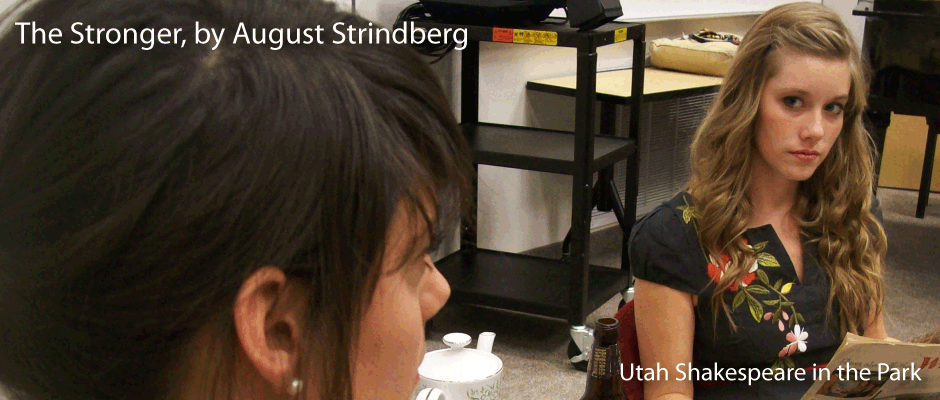PROVO — When I was in high school, my theatre teacher told me that all you need for a theatre performance were three things: an audience, a performer, and a space. This truism came to mind as I watched Utah Shakespeare in the Park’s production of August Strindberg’s The Stronger. On the evening I attended, the audience was a small handful of Utah denizens. The performers were just Taylor Peck and Chelsea Hickman. The space was a medium-sized, but comfortable classroom on the BYU campus.
August Strindberg, a Swedish playwright who died a century ago, would probably be a bigger name in theatrical history if he weren’t eclipsed by another Scandinavian: Henrik Ibsen. Both were masters of realism in the late 19th century and (along with Shaw and other realist playwrights) did much to shape modern theatre and film performance. Strindberg, however, spent much of the latter half of his career foregoing realism in favor of experimental work, much of which would be decades ahead of his time.
The Stronger is a play that marks Strindberg’s transition from realism to what we would today call expressionism. Although written in 1889, it is astonishingly modern and would have felt comfortable in the milieu of the 1930’s or 1940’s. It’s a short work—about 15 minutes long—in which one woman confronts another about their past and their relationship. Madame X (played by Hickman) and Mademoiselle Y (portrayed by Peck) have known each other for years and on Christmas Eve they happen to meet by chance at a café. X explains to Y all the hurt that she has felt through their relationship and explains why she (X) is stronger for it.
This is a challenging piece because X does all the talking. That’s right. Throughout the entire play, Y does not say a word. I thought Hickman did a marvelous job with the script and didn’t make her performance feel like an audition monologue. It’s not a particularly emotional monologue, yet Peck was able to show both the pain and the triumph that Y felt during the confrontation. Peck, though, was not a passive sponge, despite not having any lines. She still reacted and served as a useful foil to Hickman.
The Stronger is a strange play, one that would be for a director easy in some ways and difficult in others. The ease in this production is its small cast, intimate single setting, and the accessibility of the speech. On the other hand, it may be difficult to give X reasons to not respond to Y, despite the emotional barrage that X throws at her. A director must also contend with the fact that The Stronger is quite unlike much of what modern American audiences expect when they attend most plays. I thought that in her direction, Hannah Kroff balanced the needs of the script with the expectations of her audience and actors. I also believe that Kroff was wise not to let Hickman’s speech degrade into a shouting spree. However, I think that (despite the short length), that the play should have moved a little bit faster. I wish that the pauses in Hickman’s speech had been shorter and that her emotional turmoil were brought to the forefront a minute or two earlier.
At the end of The Stronger I left the performance space with many questions: Did the confrontation really happen or did Madame X imagine it? Was X really wronged by Y, or is X’s memory distorting past events? Is X projecting her motivations onto Y’s actions? Is Y cold and uncaring, or does she not seem to respond because X wouldn’t listen to her replies anyway? Which character is stronger? I really don’t know. But it’s interesting that such a short script could have me thinking for an hour or so after the play ended.
So should you see The Stronger? Yes. Strindberg is a hugely influential playwright, yet his work is rarely performed in Utah. Moreover, with free admission and a minimal time commitment, you really have little to lose by attending.
[box type=”shadow”]The Utah Shakespeare in the Park production of The Stronger plays on the BYU campus every night at 7:30 PM through October 14 and in the Orem Library (58 N. State Street, Orem) at noon and 12:45 PM on October 15. Admission is free. For exact locations of BYU performances, please visit the Utah Shakespeare in the Park website.[/box]

